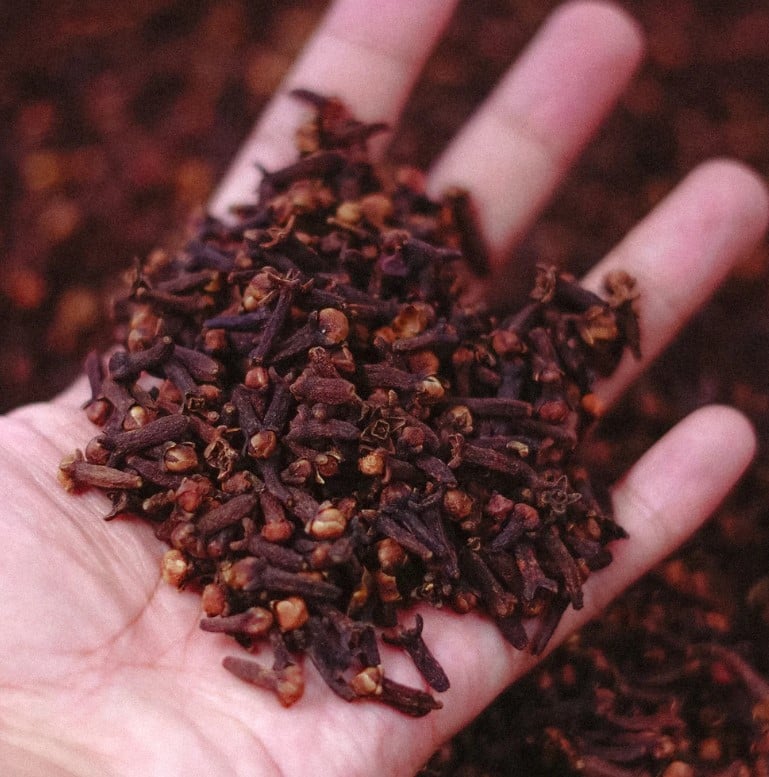Health Benefits of Cloves
Last updated on
Herbal action: antibacterial, antioxidative, antiseptic, aromatic, pain-killing, antispasmodic
Common name: cloves
Scientific name: Syzygium aromaticum
Family name: Myrtaceae (myrtle)
Parts used: flower buds
Phytonutrients and their features
- Eugenol is a monoterpenoid with a wide range of health benefits, from anti-inflammatory and antibacterial to anti-cancer and antioxidative action. Clove buds are one of the best natural sources of eugenol, and the very name of this substance is derived from the old scientific name of clove tree (Eugenia caryophyllata). Eugenol makes about 89% of clove essential oil.
- Carvacrol and thymol are phenolic compounds with powerful antibacterial properties.
- Phenolic acids (gallic, caffeic, ferulic, elegiac, salicylic) work mostly as antioxidants
- Flavonoids (kaempferol, quercetin) are natural antioxidants with anti-inflammatory, anti-cancer, and antibacterial properties
Medical uses and benefits of cloves
Cloves (and clove essential oil) have a wide range of applications, but the one that deserves special attention is their ability to combat all kinds of bacteria, viruses, and fungi.
For instance, the active compounds found in cloves and clove essential oil have been reported to be effective against such nasty threats like:
- Anaerobic oral bacteria that contribute to gingivitis
- Bacteria that are common causes of foodborne diseases, including Staphylococcus aureus and Escherichia coli
- Herpes simplex virus
- A wide range of fungi

Additional health benefits
Extremely rich in polyphenols. A study back from 2010 reported that cloves are the richest dietary source of polyphenols. The spice packs about 15,000 mg of polyphenols in 100 g. Although every polyphenol has its own health benefits, in general they are believed to prevent chronic diseases, soothe inflammation, and decrease oxidative stress.
Painkilling and antispasmodic. Eugenol, one of the major active compounds in cloves, is able to block pain perception and relieve spasms—that’s why cloves have been used as an effective remedy for tooth and joint pain since the 13th century (and probably long before that too).
May strengthen the bones and prevent osteoporosis. Eugenol has also been reported to improve osteoporosis markers, enhance calcium and phosphorus metabolism, and improve bone density in animal studies. This effect could be especially beneficial for women, since it’s a well-known fact that bone density in women quickly declines after reaching the age of 50 (men are slightly less susceptible to these age-related changes).
Reverse cirrhosis and decrease liver damage. Although high doses of eugenol are highly hepatotoxic (meaning they damage the liver), controlled intake of the substance was reported to reverse the changes seen during liver cirrhosis (in animal studies).
Has anti-platelet properties. The eugenol present in cloves has been reported to have anti-platelet properties, meaning it can prevent the formation of blood clots. This is a beneficial effect for people with high cardiovascular risk, but should be approached with caution before surgeries or when taking conventional blood thinners at the same time.
Powerful antioxidative action. Cloves are one of the richest natural sources of antioxidants. This means they can effectively alleviate any kind of inflammation and prevent free radical cell damage.
Reduce the risk of cancer. Thanks to their fabulous antioxidative action, cloves can effectively reduce the risk of tumor formation and even fight existing cancer cells. This effect was confirmed for breast cancer, cervical cancer, esophageal cancer, and prostate cancer in laboratory and animal studies.
Help to reduce blood sugar. An animal study from 2012 reported that the active compounds in cloves can effectively control blood sugar and thus help manage existing diabetes or reduce the risk of its development in the first place.

How to take cloves
There are two main ways of taking cloves for their potential health benefits.
The first is to take clove essential oil, but this will require you to carefully calculate your daily dose because it’s possible to take too much of eugenol and seriously damage the liver. Make sure to read through the instructions in the Toxicity section of this article.
For general health support and a milder action, drinking clove tea will be more than enough.
- Take a tablespoon of cloves and grind them in a grinder (or use a mortar and pestle). Your goal is to crush the cloves into small parts but not into fine powder. This will allow you to get as much of the healthy compounds as possible and easily strain the drink to remove the cloves before drinking
- Throw the ground cloves in a cup of boiling water
- Steep for 10-20 minutes
- Pour the tea through a strainer to remove the cloves
Contraindications
Hypersensitivity to any plant of the Myrtaceae family (guava, eucalyptus, myrtle, feijoa, etc.) or to cloves specifically.
Besides hypersensitivity, there are no strict contraindications to taking cloves for their potential health benefits. Not recommended to take 1-2 weeks before and after surgeries, as cloves have blood thinning properties.
Toxicity
When used as a health supplement or food additive, cloves are labeled as ”generally recognized as safe” by the FDA. However, the World Health Organization (WHO) recommends limiting daily intake of eugenol to 2.5 mg per kg of body weight.
It’s important to understand that eugenol, the main active compound in cloves, can easily damage the liver when taken in high doses. There have been lethal cases of eugenol intoxication. It is especially easy to go over the recommended maximum dose when giving clove oil to children: for example, in 2005 a study reported that 10 ml of clove oil caused fulminant liver failure in a 15-month-old boy.
So how can you calculate your safe dose of cloves or clove oil?
Here’s a quick step-by-step approach to follow.
- Multiply your body weight in kg by 2.5 to get your maximum daily eugenol dose in mg.
For example, a man weighing 80 kg would have to limit his daily eugenol intake to 80 * 2.5 = 200 mg
2) If you are taking clove essential oil, remember that eugenol makes up to 89% of the liquid and that 1 ml of oil equals roughly 1000 mg or 20 drops.
One drop, then, equals 50 mg of clove oil (1000 / 20 = 50). If eugenol makes 89% of clove oil, then one drop of the liquid contains roughly 44.5 mg of eugenol.
3) Divide your maximum daily dose by 44.5 mg to get an approximate number of drops of clove essential oil to take daily. Do NOT take more than this amount.
For example, a man weighing 80 kg would have to take no more than 4 drops (200 / 44.5 mg = 4.5, rounded down to 4 just in case)
Calculating the amount of eugenol present in fresh or dried cloves is almost impossible, as there are a lot of different factors that could affect that. It is estimated that fresh cloves can have 9 000 to 15 000 mg of eugenol per 100 g of the spice.
Some of the links I post on this site are affiliate links. If you go through them to make a purchase, I will earn a small commission (at no additional cost to you). However, note that I’m recommending these products because of their quality and that I have good experience using them, not because of the commission to be made.


































 JOIN OVER
JOIN OVER
Comments